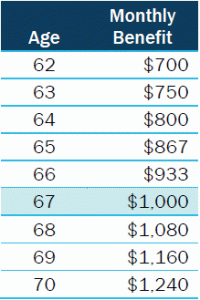Navigating social security retirement benefits
by Amy Crandall Kaser, CFP®, Portfolio Manager
May 3, 2021

In 2021, the maximum Social Security retirement benefit per person is $3,895 per month (or $46,740 per year) if filing was delayed until age 70. For a couple who earned the maximum benefit, they could receive $93,480 combined—not an insignificant sum. And, Social Security retirement benefits have the advantage of being adjusted each year for inflation. Thus, it is worth considering the various claiming options to try to maximize the benefits available to you.
Background
To qualify for Social Security retirement benefits, you must work the equivalent of ten years or have earned 40 work credits (based on wages).
There are two important terms related to Social Security retirement benefits. The first is Primary Insurance Amount, or PIA. The PIA is the dollar value of the monthly benefit that can be received in retirement. It is calculated based on the highest 35 years of earnings, indexed for inflation.
The second term is Full Retirement Age, or FRA. FRA is based on birth year. If you were born in 1954 or before, your FRA is age 66. If you were born between 1955 and 1960, your FRA is extended by two months for each year between those dates. If you were born after 1960, your FRA is 67. If you qualify for Social Security retirement benefits, you will receive 100% of the Primary Insurance Amount if you file at your Full Retirement Age.
The Claiming Options
The primary choice around Social Security retirement benefits is when to begin receipt. Benefits can be received as early as age 62 or can be delayed until age 70. The choice of when to begin has a meaningful impact on the dollar value of the benefit that will be received—benefits claimed early will be reduced and benefits that are delayed will be increased.

Benefits Taken Early Will Be Reduced: You can choose to collect Social Security retirement benefits as early as age 62. Some individuals elect this option in an effort to increase the number of years they collect benefits or out of a more immediate need for cash flow. But if you file early, your benefit amount will be reduced—by as much as 30%. And, this is a permanent reduction.

Benefits That Are Delayed Will Be Increased: You can delay receipt of benefits until age 70 and can earn what are referred to as Delayed Retirement Credits for each month you wait. If you delay filing, your monthly benefit amount is increased by 8% for each year (or 0.667% per month) that you postpone receipt of benefits until age 70. Thus, if your FRA is 67, you can increase your benefit to 124% of your PIA if you wait until 70.
An Illustration
Social Security benefits can get confusing quickly. Let’s consider the below illustration. For a worker who will receive a benefit amount of $1,000 per month whose Full Retirement Age is 67, the range of monthly benefits based on claiming at various ages is as follows:

There is more to consider, however…
Spousal Benefits
If you are married, your spouse can also receive benefits even if they have not qualified based on their own work history. The only requirement is that you have been married for at least one year. Benefits are equal to 50% of your Primary Insurance Amount. If your spouse has qualified based upon their own work history, they get the higher of their own benefit or their spousal benefit.
Also important to note is that if you elect to begin receiving benefits prior to your Full Retirement Age, and your spouse intends to file for spousal benefits, those spousal benefits will also be decreased by the same percentage as your reduced amount.
Here is where there can be a negative to delaying receipt of benefits. For your spouse to receive spousal benefits, you must have filed for benefits. For a couple with a wider age gap, the spousal benefit will be foregone until the primary worker files for receipt of benefits. And, spousal benefits do not earn delayed retirement credits.
Survivor Benefits
Another important consideration is that if a married person is survived by their spouse, the spouse will receive the larger of their own benefit or the benefit their spouse was receiving, including any Delayed Retirement Credits. Thus, it is not just your lifespan that matters, but also the lifespan of your spouse.
Navigating Choices
The option of delaying receipt of benefits to earn Delayed Retirement Credits is attractive, particularly in today’s low interest rate environment. Ultimately, how long someone lives will determine the economics of taking benefits early, at full retirement age, or delaying. While this is an unknown, there are other considerations.
For spouses who have both qualified for benefits, it is beneficial to coordinate claiming strategy. For example, if there is a four year age gap between spouses, one spouse may delay receipt until age 70 to earn delayed credits, and the other spouse could claim at their Full Retirement Age, allowing the couple to receive one benefit while delaying the other. The projected lifespan of each spouse and the amount of their benefit should be taken into consideration to decide who should file when.
In summary, choosing the optimal Social Security strategy is not always as clear cut as it may seem at first glance. If you are interested in analyzing your claiming options, we are here to walk you through the various choices available to you so that you can make an informed decision.
Information provided herein is not intended to be used as investment advice, an offer to purchase or sell the securities, or a solicitation or offer to sell investment advisory services. Boston Trust Walden Company, its staff, and affiliates (collectively “BTW”) do not provide tax, accounting, or legal advice. You should consult with your legal or tax advisor prior to taking any action relating to the information contained herein. Opinions expressed may be different from time to time than those presented by different authors or BTW. Data contained herein are derived from sources believed to be reliable at time of publication however, they may not be complete or accurate at all times and we undertake no, obligation to advise you of any changes or to provide an update.
About Boston Trust Walden Company
We are an independent, employee-owned firm providing investment management services to institutional investors and private wealth clients.





